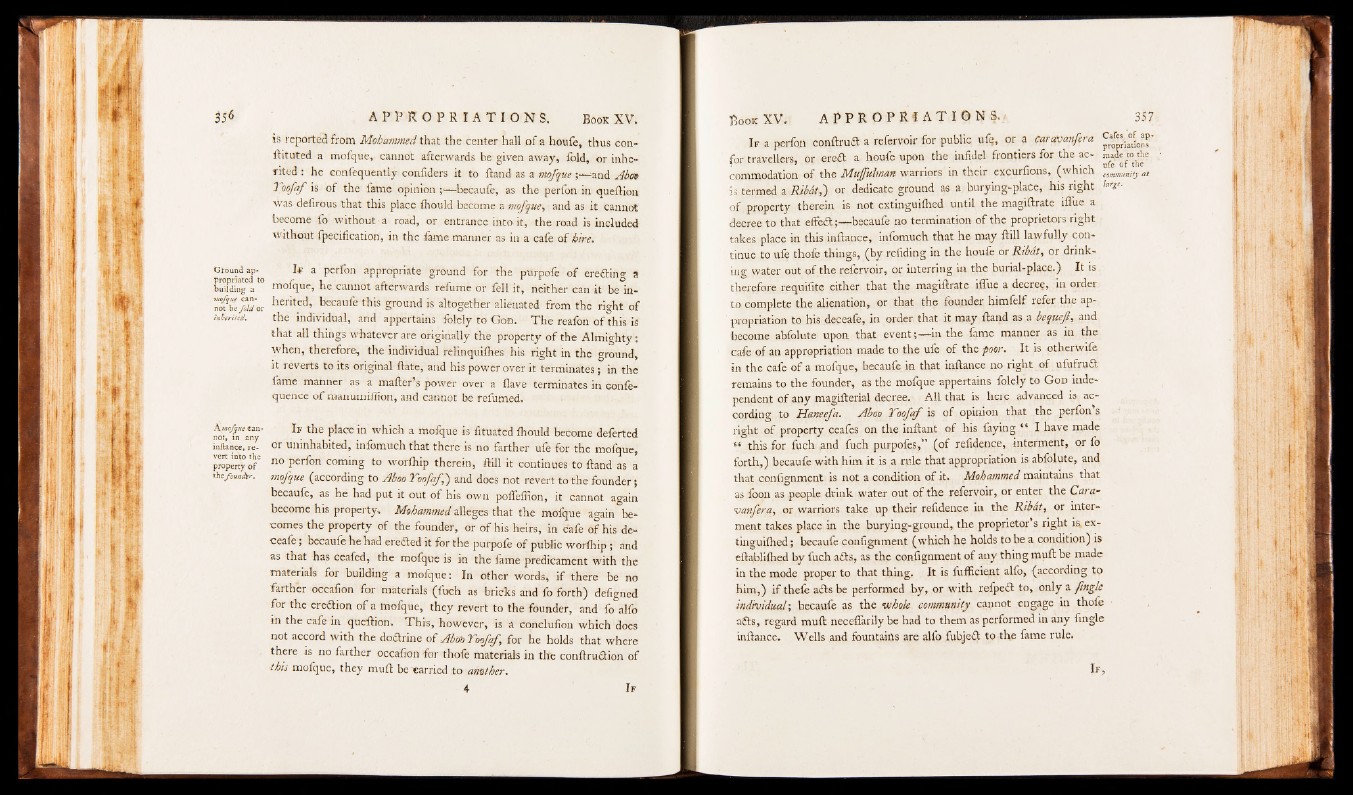
Ground appropriated
to
building a
mofque cannot
be fold or
inherited
Ktnofque cannot,
in any
inftance, revert
into the
property o f
the founder.
is reported From Mohammed that the center hall of a houfe, thus con-
ftituted a mofque,- cannot afterwards be given away, fold, or inherited
: he eonfequently confiders it to Hand a's a mofque ;—-and Abm
¥oofaf is of the fame opinion ;— becaufe, as the perfon in queftion
was defirous that this place Ihould become a mofque, and as it cannot
become fo without-a road, or entrance into it, the road is included
without fpecification, in the fame manner as in a cafe of hire.
I# a perfon appropriate ground for the plirpofe of erecting a
mofque, he cannot afterwards refume or fell it, neither can it be inherited,
becaufe this ground is altogether alienated from the right of
the individual, and appertains folely to G o d . The reafon of this is
that all things whatever are originally the property of the Almighty:
when, therefore, the individual relinquifhes his right in the »round,
it reverts to its original ftate, and his power over it terminates; in the
fame manner as a mailer’s power over a Have terminates in confer
e n c e of manumiffion, and cannot be refumed.
If the place in which a mofepie is fituated Ihould become deferted
or uninhabited, infomuch that there is no farther ufe for the mofque,
no perfon coming to worlhip therein, ftill it continues to Hand as a
mofque (according to Aboo Ysofaff and does not revert tothe founder;
becaufe, as he had put it out of his own pofleflion, it cannot again
become his property, Mohammed alleges that the mofque again becomes
the property of the founder, or of his heirs, in cafe of his de-
ceafe; becaufe he had erected it for the purpofe of public worlhip; and
as -that has ceafed, the mofque is in the lame predicament with the
materials for building a mofque: In other words, if there be no
farther occalion for materials (fuch as bricks and fo forth) defigned
for the eredlion of a mofque, they revert to the founder, and fo alfo
in the cafe in queftion. This, however, is A conclufion which does
not accord with the dodlrine of Abb'o Yoofaf, for he holds that where
there is no farther occalion for thofe materials in the conllruction of
-this mofque, they mull be'carried to another.
4 If
If a perfon conftruft a refervoir for public ufi;, or a caravanfera
for travellers, or eredt a houfe upon the infidel frontiers for the ac- to *e •
commodation of the ^dujfulman warriors in their excurfions, (which commUnity at
is termed a Ribdt,) or dedicate ground as a burying-place, his right hr&‘ -
of property therein is not extinguilhed until the magiftrate ifliie a
decree to that effedl;— becaufe no termination of the proprietors right
takes place in this inftance, infomuch that he may Hill lawfully continue
to ufe thofe things, (by refiding in the houfe or Ribdt, or drinking
water out o f the refervoir, or interring in the burial-place.) It is
therefore requifite either that the magiftrate iffue a decree, hi order
to complete the alienation, or that the founder himfelf refer the appropriation
to his deceafe, in order that it may Hand as a beqtiejl, and
become abfolute upon that event;— in the fame manner as in the
cafe of an appropriation made to the ufe of the foor. It is otherwife
in the cafe of a mofque, becaufe in that inftance no right of ufufrudt
remains to the founder, as the mofque appertains folely to G o d independent
of any magifterial decree. All that is here advanced is according
to Haneefa.. Aboo Yoofaf is of opinion that the perlon s
right of property ceafes on the inftant of his faying “ I have made
“ this for fuch and fuch purpofes,” (of relidence, interment, or lb
forth,) becaufe with him it is a rule that appropriation is abfolute, and
that confignment is not a condition of it. Mohammed maintains that
as foon as people drink water out of the refervoir, or enter the Caravanfera,
or warriors take up their relidence in the Ribdt, or interment
takes place in the burying-ground, the proprietor’s right is, extinguilhed
; becaufe confignment (which he holds to be a condition) is
eftablilhed by fuch adts, as the confignment of any thing mull be made
in the mode proper to that thing. It is fufficient alfo, (according to
him,) if thefe adts be performed by, or with refpedt to, only a fingle
individual; becaufe as the whole community cannot engage in thofe
adts, regard mull neceflarily be had to them as performed in any fingle
inftance. Wells and fountains are alfo fubjedt to the fame rule.
If,